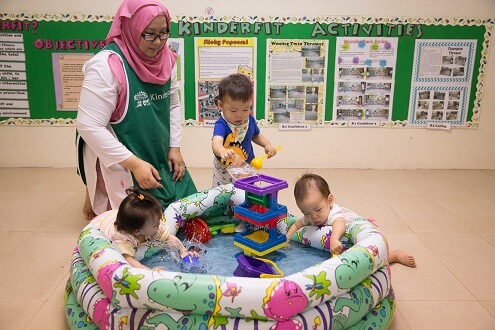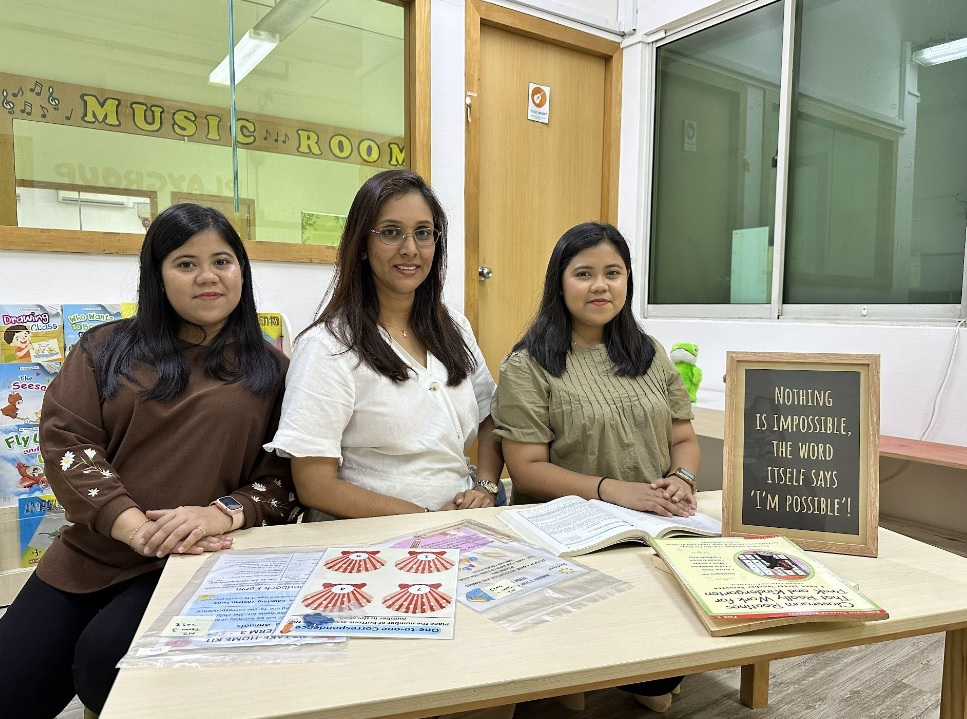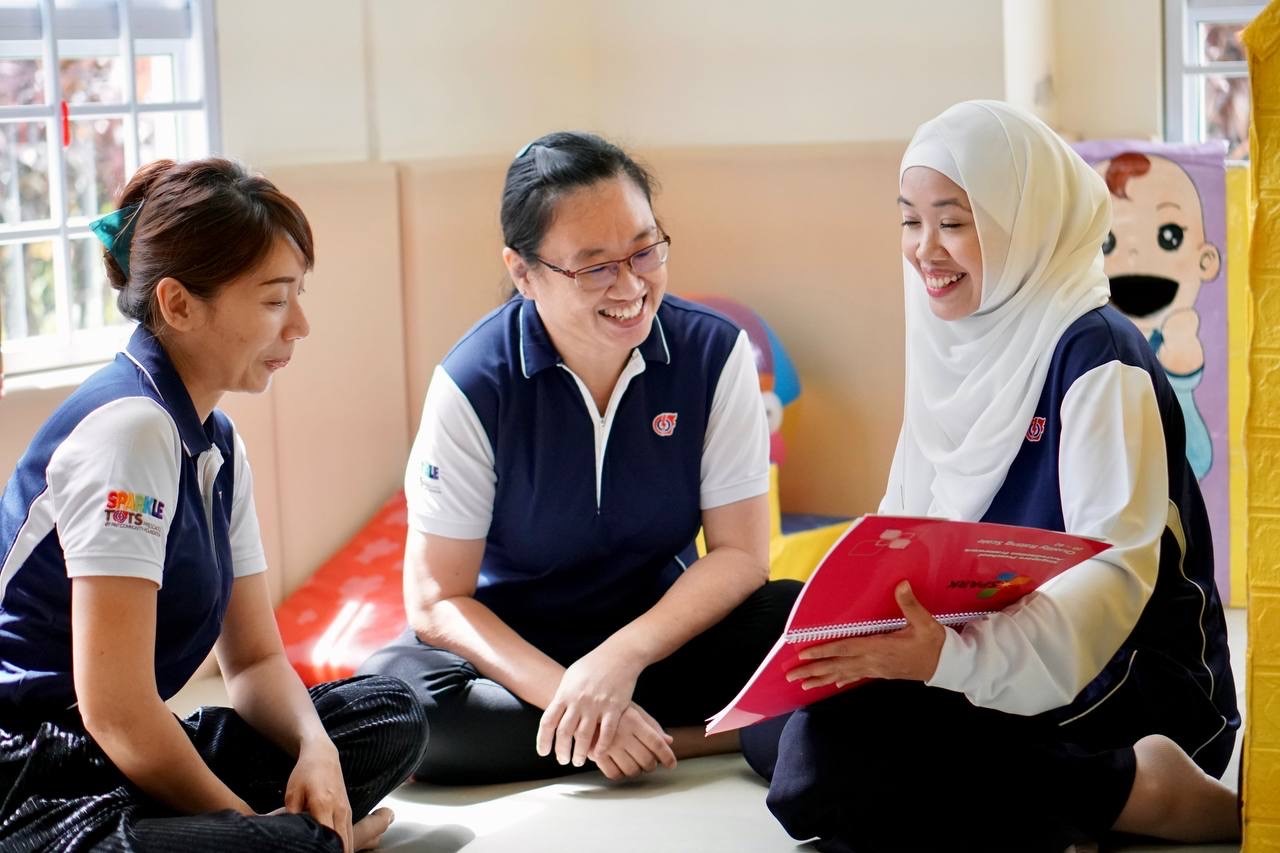Making a Difference with Teamwork
The role of an infant educarer is an extremely important one as provision of quality care is crucial in the early years. While the job has its challenging moments, working with a supportive team of passionate individuals makes the career highly fulfilling.

The Infant Educarer Team at Kinderland @Republic Polytechnic
It was nearing the end of the day, and the infants at Kinderland Preschool @ Republic Polytechnic were waiting for their parents to pick them up. Infant educarer, Miss Sabrina Wang, fondly known as Teacher Sabrina, was busy with her end-of-day routine at the centre when she heard a child shout: “Daddy!”
The shout had come from Clara, a little girl under her care. Teacher Sabrina was pleasantly surprised as it was the first time she had heard Clara speak.
“Usually she does not speak, she would keep quiet even when we were using words that she already knows. I was so happy to hear her voice– it was a priceless moment, something money can’t buy,” Teacher Sabrina recalls.
 |  |
Teacher Sabrina having a fun learning time with Clara.
Little milestones like these are meaningful for infant educarers. Their roles not only involve attending to the infants’ daily needs, monitoring their developmental milestones, but also creating learning opportunities through planned programmes and activities, as well as during care routines such as bathing, feeding and diaper changing.
Educarers also need to frequently engage parents and keep them updated about their child’s learning and development on a daily basis. This is important as infants are unable to recount their daily experiences to their parents when they reach home.
No doubt the days are filled with numerous challenges. Having to tend to the varied care and learning needs of individual infants is no easy task. But it is all worth it as the educarers get to witness each infant achieving their key developmental milestone. The significance is further amplified when they develop special bonds with the infants under their care – similar to what Teacher Sabrina has with Clara.
 |  |
 |  |
Diapering, showering and feeding are some of the care routines that educarers must carry out for individual infants on a daily basis. This is on top of planning and conducting the infants’ daily learning activities.
When Teacher Sabrina joined Kinderland Preschool @ Republic Polytechnic in April 2016, Clara was 10 months old and had only been in the infant care centre for two months. With a shy temperament, Clara naturally registered Teacher Sabrina as an unfamiliar face when they first met.
Teacher Sabrina recalled, “She actually pushed me away. And she would try to run away when she saw me coming.”
“If you are a stranger to the babies, they will be unsure and uneasy,” Teacher Sabrina’s colleague, Mrs Rathnamala (otherwise known as Teacher Mala), explained.
“You have to help the infants feel secure. Build trust and relationships with the infants by spending time with them, understanding them, and giving them the feeling that you are actually helping and caring for them,” added Teacher Noryana, another educarer from Kinderland @RP.

Teacher Noryana having a water play session with the infants
Winning the trust of the child is one of the more challenging parts of the job. However, this is one challenge that the infant educarers from Kinderland @RP strive to overcome as a team.
In the case of Clara, Teacher Sabrina’s colleagues supported her by creating opportunities for them to interact and forge a relationship. They also often offer words of encouragement and discuss strategies for Teacher Sabrina to engage Clara meaningfully, such as through music and movement, an activity that Clara enjoys.
Teacher Sabrina eventually broke the ice and gained Clara’s trust. Soon, Clara began to approach Teacher Sabrina on her own, and would greet her with a hug every time.
A bond, like the one Teacher Sabrina and Clara have, takes time and effort to build. It is not easy to achieve, especially when working with infants who are pre-verbal. But all three educarers agree unanimously that infants understand a lot more than they let on.
 |  |
Each cry, expression and action from the infants is a meaningful and intentional one. They are trying to tell you something. Educarers must learn to decode them in order to better understand the infant under their care.
Along the same vein, infants are also incredibly sensitive to their educarer’s tone of voice and will react accordingly.
“You must always be friendly and kind when working with infants!” Highlights Teacher Mala.
However, she concedes that infants are not the easiest charges to deal with.
She said, “Infants don’t always listen when you give them instructions. You can’t show your anger. You need to slowly talk to them to help them understand. In some cases, I will demonstrate the action to them. I’ll also ask them questions like ‘why don’t you want to do this’. Through my support, maybe tomorrow they will do it themselves.”
The team uses this same patience and love to gain the trust of parents – especially parents dropping off their children at the centre for the first time.
“We will ask them about how the child is at home. Based on what the parents share with us – preferences, dislikes, habits, etc – we observe the infants’ behaviours and keep parents updated on any changes,” Ms Noryana said.
She added that this helps reassure parents that the educarers are paying attention to their child.
Teacher Mala also puts parents at ease by sharing examples of other parents facing similar situations. She and her colleagues also take the time to update parents through calls during lunchtime, in addition to updating them at the end of the day when they arrive at the centre to pick up their children.
 |  |
Teacher Mala with parents
Updates like these were appreciated by Mr Norulhisam Mohamad, whose daughter recently graduated from infant care.
He said, “The times when she got sick – with rashes or diarrhea – or occasions when she was being rough to others or other children were rough with her. These were all highlighted to us. It’s a good practice so we know what was going on.”
But for the educarer team from Kinderland @RP, having to manage children and parents also means the day can be hectic and often unpredictable. What helps, they chimed, is knowing they can count on one another for help.
For example, they hold frequent discussions to exchange information about the infants. Formal meetings are held twice a month, but unofficial discussions occur almost on a daily basis.
At these sessions, the educarers discuss solutions for issues they have encountered. For instance, if a child is unable to meet a developmental milestone, the team will brainstorm and think of activities to assist the child in meeting the appropriate milestones. Also, if any member of the team is having difficulty in planning an activity for the children – whether in finding a suitable resource or coming up with an idea – everyone will step in to help.
“As each educarer has a unique way of managing the children, these sessions are also an ideal platform to learn about and appreciate each other’s differences,” Teacher Noryana said. She added that the sessions were encouraging to her and have helped her improve her skills as an educarer.

Teacher Sabrina said that she was also motivated by the thoughtfulness and sincerity of the team around her. On one occasion, she shared, she was accepted into a course which falls on the same Saturday she was scheduled to work. In order to make it for her course, she had planned to complete her assigned chores on Friday before leaving the centre. But to her surprise and relief, all her colleagues stepped in and offered to change their shift with her.
“I felt very good as it was not a case of ‘you want to go to your course, it’s your problem’. Instead, it was team support and a collective effort,” she said.
.jpg?sfvrsn=b62c383e_1)





